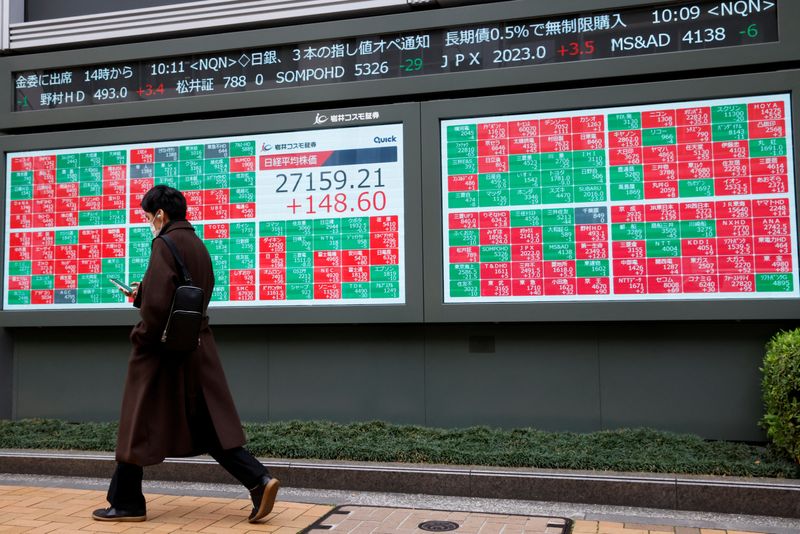By Jamie McGeever
(Reuters) - A look at the day ahead in Asian markets.
Asian stocks should have a spring in their step on Tuesday after a positive start to the week locally and globally on Monday, supported by a recovery in tech shares, calm in fixed income markets, and a cooling in geopolitical tensions.
Tuesday's economic calendar is pretty full, with purchasing managers index reports from Japan, Australia and India, consumer inflation from Singapore and Hong Kong, producer inflation from South Korea and industrial production from Taiwan all on deck.
Currency traders remain on high alert for yen intervention with the dollar getting closer to 155.00 yen, although there is a question whether Tokyo will act so close to the Bank of Japan's two-day policy meeting that starts on Thursday.
China's yuan remains on the defensive too, slipping to a five-month low against the dollar on Monday.
Overall sentiment is fairly buoyant after the S&P 500 and Nasdaq rebounded on Monday, as tech clawed back some of last week's losses and Middle East tensions cooled.
Investors now turn their attention to this week's earnings from some of these tech giants - Tesla (NASDAQ:TSLA), Meta (NASDAQ:META) Platforms, Alphabet (NASDAQ:GOOGL) and Microsoft (NASDAQ:MSFT) announce their quarterly results this week, which will go a long way to determining the outlook for U.S. and global stocks in the months ahead.
The 'FANG' index of mega U.S. tech stocks rose on Monday, snapping a six-day losing streak in which the index lost 10%. According to analysts at A.J. Bell, the 'Magnificent Seven' of Alphabet, Amazon (NASDAQ:AMZN), Apple (NASDAQ:AAPL), Meta Platforms, Microsoft, NVIDIA (NASDAQ:NVDA) and Tesla lost $1.1 trillion of market cap in those six days.
Shares in Taiwan Semiconductor Manufacturing Co (TSMC), the world's largest contract chipmaker, will be looking to bounce back from Monday's 1% fall. That followed a 6% slide on Friday after the company reported first quarter results.
Official figures from Taipei on Monday showed that export orders rose less than expected in March, but the government was confident that surging demand for artificial intelligence applications will fuel future demand for the island's high-tech products.
An air of caution still hangs over markets though. Financial conditions are the tightest this year, according to Goldman Sachs (NYSE:GS)'s financial conditions indices, driven almost entirely by rising long and short rates.
The question now is how much higher will bond yields go? The two- and 10-year U.S. Treasury yields have both risen almost 100 basis points from recent lows, with the two-year yield nudging what many investors will consider an attractive and natural buying point of 5.00%.
If yields level off, bond volatility is likely to subside, which in turn should help cool volatility in other markets. Implied U.S. equity volatility, which spiked to a six-month high on Friday, posted its biggest fall in six months on Monday.
Relief, but maybe only briefly.
Here are key developments that could provide more direction to markets on Tuesday:
- Japan flash PMIs (April)

- Singapore CPI (March)
- Taiwan Industrial production (March)
(By Jamie McGeever)